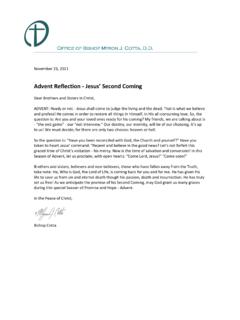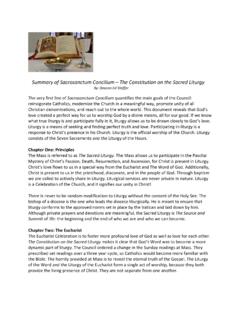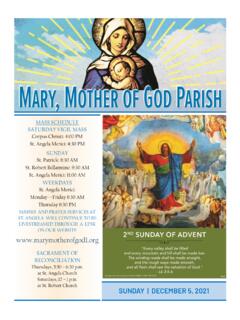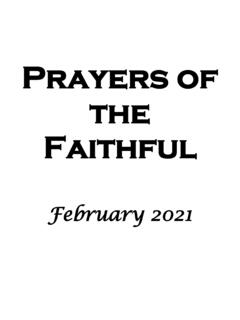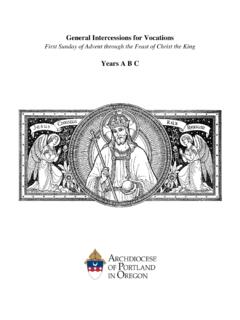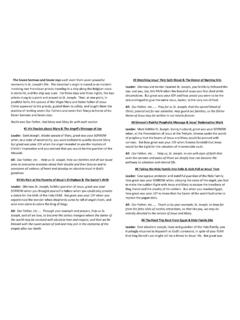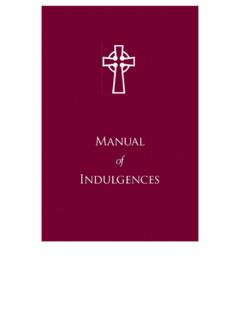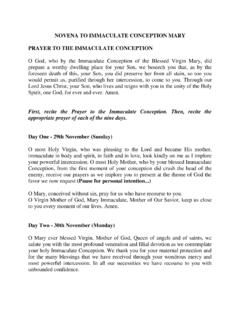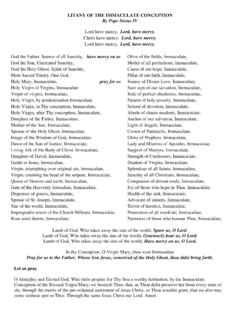Transcription of FIRST GRADE SYLLABUS AND CURRICULUM INFORMATION …
1 FIRST GRADE SYLLABUS AND CURRICULUM INFORMATION FIRST GRADE English Language Arts SYLLABUS GRADE Level/Dept. FIRST GRADE Instructor Lisa McCloud Certification/s Endorsements in Language Arts and Social Studies for grades K-8 Degree/s Bachelors of Science in Elementary Education Psychology Minor Textbook/ Houghton Mifflin Harcourt: Journeys (2014) Resources Decodable Phonics Readers, Interactive Whiteboard Lessons E-MAIL 1. Comprehension Skills and Strategies Q1 Q2 Q3 Q4 a. Activate and use prior knowledge to make predictions and draw conclusions. X X X X b. Identify the author s messages and recognize the cause and effect in a reading selection. X X X X c. Explain the parts of a story in your own words by identifying the main idea, supporting details, and analyzing the characters and events. X X X d. Make connections: text to text, text to self, text to world and distinguish between realistic story and a fantasy.
2 X X X X 2. Fluency Q1 Q2 Q3 Q4 a. Read with accuracy: 90-94% for instructional level and 95-100% for independent level X X X X b. Read aloud with appropriate expression X X X c. Read aloud with comprehension X X X X d. Recognize high frequency words X X X X 3. Language Conventions (spelling, grammar) Q1 Q2 Q3 Q4 a. Spell many FIRST GRADE high frequency words and high utility words X X X X b. Identify nouns, verbs, pronouns, adjectives, adverbs and prepositions X X X c. Recognize the differences between different types of sentences. X X X 4. Phonological Awareness/ Foundational Skills Q1 Q2 Q3 Q4 a. Recognize and produce rhyming words and compound words. X X X X b. Blend sounds of letters to decode short and long vowels X X X X c. Blend sounds of letters to decode consonants, consonant blends, and consonant and vowel digraphs. X X X X d. Identify words that are the same and opposite X X X 5.
3 Writing Process Q1 Q2 Q3 Q4 a. Write complete sentences X X X b. Write a personal narrative X X X X c. Write an informational text. X X X d. Use capitalization in writing (beginning of sentences, I) and use periods, question marks, and exclamation marks in writing X X X Types of Classroom Learning Activities Used to Reach Goal Types of Assessments Given to Measure Student Progress Whole group instruction Games Centers Accelerated reader tests Ipad apps Journal writing Group work Individual work Interactive white board activities Workbook pages Worksheets Comprehension, Phonics, and Vocabulary Tests Exit Tickets for each Common Core Standard Observations Classwork Conferencing Running Records CLASSROOM EXPECTATIONS: Raise your hand. Treat others as you would like to be treated. Walking Feet in the buildings. Keep hands, feet and objects to yourself.
4 Be Respectful ENRICHMENT OPTIONS: Journal Writing iPad apps Accelerated Reader Performance Level Description Secure The student CONSISTENTLY demonstrates secure mastery of the GRADE level learning goal. Approaching The student USUALLY demonstrates mastery of the GRADE level learning goal. Progressing The student SOMETIMES demonstrates mastery of the GRADE level learning goal, or the student needs teacher support to meet the targeted goal. Beginning The student INFREQUENTLY demonstrates performance of the GRADE level learning goal. The student needs reteaching and extra support to understand what is required to meet the learning goal. FIRST GRADE Mathematics GRADE Level/Dept. FIRST GRADE Instructor Lisa McCloud Certification/s Endorsements in Language Arts and Social Studies for grades K-8 Degree/s Bachelors of Science in Elementary Education Psychology Minor Textbook/ McGraw-Hill: My Math Resources Hands on math manipulatives, Interactive Whiteboard Lessons, songs and videos E-MAIL 1.
5 Operations and Algebraic Thinking Q1 Q2 Q3 Q4 a. Use addition within 20 to solve equations and word problems with three numbers or less. X X X X b. Use subtraction within 20 to solve equations and word problems X X X X c. Describe the relationship between adding and subtracting X X X X d. Determine if problems are true or false X X X 2. Number and Operations in Base Ten Q1 Q2 Q3 Q4 a. Demonstrate a two digit number using tens and ones blocks and identify place value up to 99. X X b. Compare two digit numbers using the symbols <, =, > X X c. Add a two digit number and a one digit number X d. Add and subtract multiples of 10 X 3. Measurement and Data Q1 Q2 Q3 Q4 a. Order three objects by length X X b. Determine the length unit of an object X X c. Tell time in hours and half-hours X X d. Count money (pennies, nickels, dimes, quarters, and dollars) X X 4.
6 Geometry Q1 Q2 Q3 Q4 a. Distinguish attributes of shapes X b. Compose two dimensional shapes (rectangles, squares, trapezoids, triangles, half circles, and quarter circles) X c. Compose three dimensional shapes (cubes, right rectangular prisms, right circular cones, and right circular cylinders) X d. Partition and describe shares of circles and rectangles into two and four equal parts like halves fourths, and quarters. X Types of Classroom Learning Activities Used to Reach the Goal Types of Assessments Used to Measure Student Progress Whole group instruction Small groups Centers Partner work iPad apps Classwork (worksheets, workbook) Chapter Tests Observation Exit Tickets for Common Core Math Conferencing CLASSROOM EXPECTATIONS: Raise your hand. Treat others as you would like to be treated. Walking Feet in the buildings. Keep hands, feet and objects to yourself.
7 Be Respectful ENRICHMENT OPTIONS: iPad Apps Online websites ( ) Enrichment worksheets Performance Level Description Secure The student CONSISTENTLY demonstrates secure mastery of the GRADE level learning goal. Approaching The student USUALLY demonstrates mastery of the GRADE level learning goal. Progressing The student SOMETIMES demonstrates mastery of the GRADE level learning goal, or the student needs teacher support to meet the targeted goal. Beginning The student INFREQUENTLY demonstrates performance of the GRADE level learning goal. The student needs reteaching and extra support to understand what is required to meet the learning goal. FIRST GRADE Religion GRADE Level/Dept. FIRST GRADE Instructor Lisa McCloud Certification/s Endorsements in Language Arts and Social Studies for grades K-8, Catechist Certified Degree/s Bachelors of Science in Elementary Education Psychology Minor Textbook/ Sadlier/ We Believe Resources Classroom retreats and Catholic songs, videos, and websites.
8 E-MAIL 1. We believe in God the Father, God the Son and God the Holy Spirit. Q1 Q2 Q3 Q4 e. Explain that God is a loving parent that gave us the gift of this world and forgives us of our misdeeds. X X f. Describe that Jesus is God s gift to us, our savior, friend, and brother. X X X X g. Name specific events of Jesus s life. (birth, ministry, death and resurrection). X X X X h. Explain that the Holy Spirit came to the disciples on Pentecost, and describe the Holy Spirit as God s presence in our lives. X X 2. We belong to the mystery of the Church, and God teaches us to live out our salvation. Q1 Q2 Q3 Q4 e. Repeat bible stories, stories of saints, and stories of early Christians. X X X X f. Express for actions/choices that are contrary to Jesus s teachings. X X X X g. Explain the 10 Commandments and know that they are a guide given to us by God. X h.
9 Identify that our baptism calls us to be stewards of God s faith for others. X X 3. God invites us into a relationship of prayer and worship. Q1 Q2 Q3 Q4 e. Practice prayer in a variety of ways. X X X X f. Recite prayers: Sign of the Cross, Our Father, Hail Mary and Glory Be. X X X g. Identify the seven sacraments. X X h. Distinguish between Advent, Christmas, Lent and Easter X X X X 4. God calls us to love and serve our neighbor Q1 Q2 Q3 Q4 e. Express that Jesus teaches that we should love God, others, and our self. X f. Practice acts of service. X X X X g. With prompting, state how the church works for justice, peace and love. X X h. Recognize that Catholicism extends to all people regardless of race or nationality X X Types of Classroom Learning Activities Used to Reach the Goal Types of Assessments Used to Measure Student Progress Whole group instruction Small groups Partner work Religious videos Catholic websites Classwork (worksheets, workbook) Observation Conferencing CLASSROOM EXPECTATIONS: Raise your hand.
10 Treat others as you would like to be treated. Walking Feet in the buildings. Keep hands, feet and objects to yourself. Be Respectful ENRICHMENT OPTIONS: Bible study Service projects Enrichment worksheets Performance Level Description Secure The student CONSISTENTLY demonstrates secure mastery of the GRADE level learning goal. Approaching The student USUALLY demonstrates mastery of the GRADE level learning goal. Progressing The student SOMETIMES demonstrates mastery of the GRADE level learning goal, or the student needs teacher support to meet the targeted goal. Beginning The student INFREQUENTLY demonstrates performance of the GRADE level learning goal. The student needs reteaching and extra support to understand what is required to meet the learning goal. FIRST GRADE Science GRADE Level/Dept. FIRST GRADE Instructor Lisa McCloud Certification/s Endorsements in Language Arts and Social Studies for grades K-8 Degree/s Bachelors of Science in Elementary Education Psychology Minor Textbook/ Pearson Interactive Science Resources Science Songs, Science Songs Coloring Book, Multi-Disciplinary Flip Chart, STEM Activity Book, Readers Theater, Science Websites E-MAIL 1.
